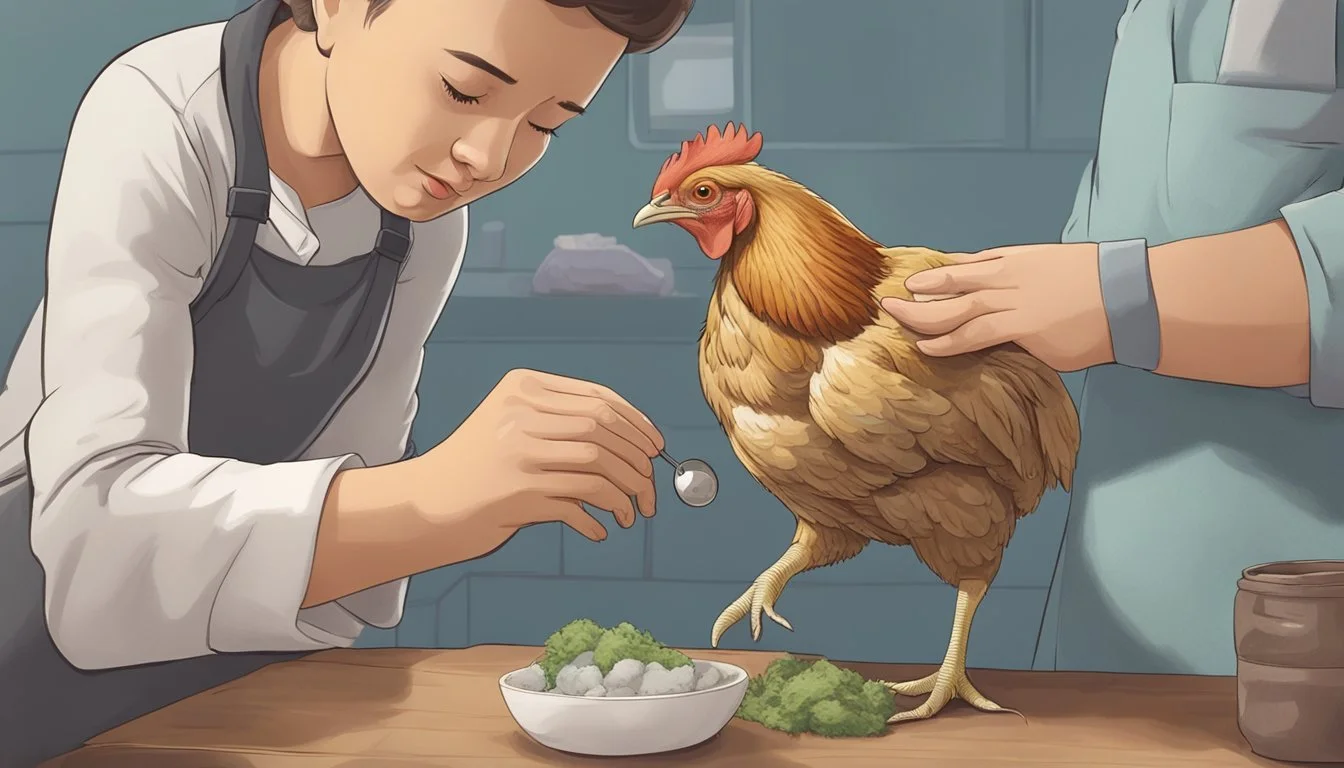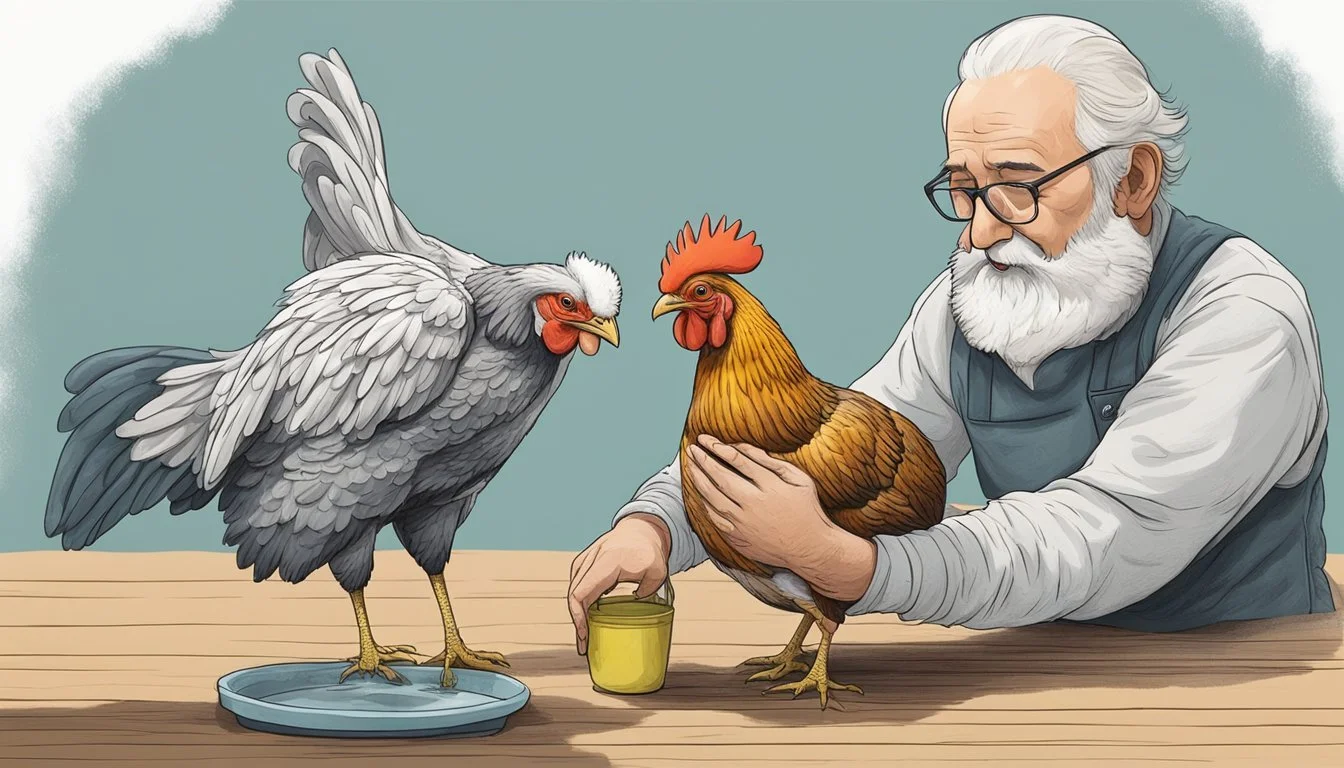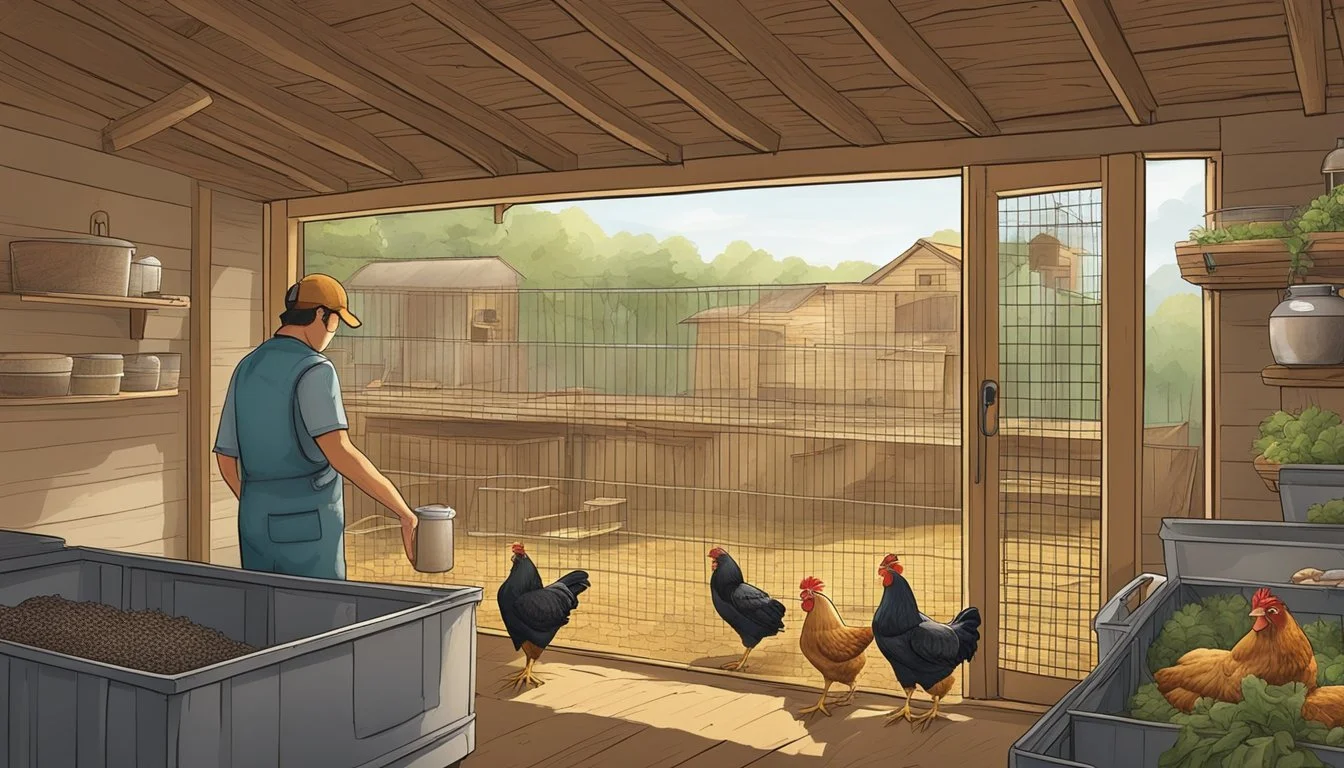How do I Treat a Sick Chicken?
Essential Care Tips for Poultry Health
When a chicken falls ill, prompt and appropriate care is crucial to its recovery and the health of the entire flock. Recognizing the signs of a sick chicken is the first step in providing treatment, which includes symptoms such as lethargy, abnormal droppings, and a decline in egg production. Providing a sick chicken with a separate, warm environment away from the healthy flock members reduces stress and prevents the potential spread of disease.
Caregivers need to address various chicken health issues, from respiratory infections to parasites. For instance, cleaning a chicken's wounds with a diluted betadine solution and applying antibiotic spray can be an effective treatment for external injuries. Tackling illnesses requires a strategic approach, which might involve the use of specific medication or changes in diet and housing.
The path to treating a sick chicken involves careful observation, precise care, and occasionally the advice of a veterinary professional, especially when dealing with contagious diseases or severe symptoms. A comprehensive understanding of chicken healthcare can equip poultry keepers with the necessary tools to ensure the well-being of their flock.
Recognizing the Signs of Illness
Recognizing when a chicken is unwell is crucial for prompt treatment. Key indicators of illness may include changes in behavior, appearance, and physiological functions like eating habits and egg production.
Identifying Sick Chicken Symptoms
A sick chicken may exhibit a range of symptoms that signal illness. Key behavioral changes to look for include:
Lethargy or lack of energy
Difficulty walking or standing
Less social interaction or isolation from the flock
Ruffled feathers or a hunched appearance
Physical signs could consist of:
Swollen eyes or nasal discharge
Coughing, wheezing, or labored breathing
Changes in comb or wattle color, such as paleness or discoloration
Understanding Changes in Droppings and Appetite
One of the immediate signs that a chicken is not in good health involves changes in its droppings and appetite. Notable changes include:
Drop in appetite: A sick chicken may stop eating or show less interest in food.
Droppings: Healthy chicken droppings vary in color and consistency, but black, tarry stools, bloody or watery droppings can be concerning.
These symptoms indicate that the chicken's body is fighting an illness and may require intervention.
Observing Egg Production Issues
Eggs can be an indicator of a hen's health. A decline in production or abnormalities in the eggs themselves can point to health issues. These abnormalities may manifest as:
Irregularly shaped eggs
Soft or shell-less eggs
Frequent observation of these issues in a hen's eggs can be linked to conditions like infectious bronchitis or Egg drop syndrome. These are significant signs that a hen may be sick and in need of attention.
Creating a Healthy Environment
A healthy environment is crucial for the wellbeing of backyard chickens. It involves proper ventilation to prevent respiratory issues, a clean coop to minimize the spread of disease, and adjusting light and warmth to support their daily cycles and comfort.
Ensuring Proper Ventilation
Ventilation in a chicken coop is essential to remove moisture, ammonia, and other gases that can harm chickens' respiratory systems. Proper airflow helps maintain a fresh atmosphere inside the coop, reducing the risk of respiratory illnesses. One should ensure there are sufficient openings or vents that are positioned to avoid drafts directly on the birds while still promoting good air exchange.
Maintaining Clean Coops
Chickens thrive in a clean environment, which helps prevent the spread of disease and parasites. Regular removal of droppings and wet bedding is necessary. The coop's floor and nests should be lined with dry, absorbent material, and all fixtures should be regularly disinfected. A clean coop also helps deter rodents and pests that could introduce diseases.
Adjusting Light and Warmth
Light plays a vital role in regulating a chicken's life cycle, including their laying patterns. Chickens generally need around 14-16 hours of light per day. In contrast, warmth is particularly important during colder months; the coop should be insulated but not completely sealed, as some air exchange is necessary. One can use safe heating elements if necessary, but it's crucial to avoid overheating the coop or creating fire hazards.
Nutrition and Hydration
Proper nutrition and hydration play vital roles in the recovery of a sick chicken. Ensuring easy access to the right foods and water can significantly impact their healing process.
Feeding for Optimal Health
A sick chicken requires a diet high in protein to help fight illness and regain strength. Scrambled eggs are an easily digestible source of high-quality protein and essential nutrients that can be especially beneficial. For chickens with decreased appetites, offering a mash made from a combination of their regular feed with a protein-rich treat, like cooked eggs, can encourage eating. The Pioneer Chicks suggest that simplicity is key, and one should avoid overcomplicating their diet.
Hydrating Sick Chickens
Chickens must remain adequately hydrated, especially when battling illness. Provide clean, fresh water at all times to support the immune system and promote recovery. A sick chicken might not drink sufficient water on its own, so it can be necessary to encourage hydration by placing the waterer near the chicken and ensuring easy access. According to guidelines from knowaboutchickens.com, continuous access to water is critical for a sick chicken's well-being.
Using Supplements Wisely
Supplementing a sick chicken’s drinking water with vitamins, minerals, and probiotics can be beneficial, but must be done wisely. Electrolytes can help if the chicken has diarrhea, but should only be used as needed. Similarly, adding garlic to the water can assist occasionally, but it should not become a constant in their diet. Consistency is important — sudden changes can stress a sick chicken, potentially worsening its condition.
Disease Prevention and Treatment
To maintain a flock of healthy chickens, disease prevention measures and timely treatment protocols are crucial. Poultry keepers need to be vigilant about biosecurity practices and responsive to signs of illness for the well-being of their chickens.
Implementing Effective Quarantine Measures
Quarantine is a crucial step in preventing the spread of diseases within a poultry flock. A separate quarantine pen should be established for new birds, birds returning from shows, or those exhibiting illness. Keeping these birds isolated for at least 30 days allows owners to observe for signs of common chicken illnesses such as coccidiosis or respiratory infections without risking the health of the entire flock.
Administering Antibiotics and Medications
Responsible use of antibiotics and medications is fundamental in treating bacterial chicken diseases. Medications should only be used as directed by a veterinarian to combat specific infections. Misuse can lead to antibiotic resistance or harm to baby chicks and egg-laying hens. It's essential to diagnose whether a chicken ailment is bacteria-related before administering antibiotics, as they are not effective against viruses or parasites.
Preventing Common Chicken Diseases
Preventative measures are key to avoiding the occurrence of common chicken diseases. Maintain coop cleanliness to deter mites and parasites, and regularly de-worm to prevent internal worms. Vaccinations can protect against certain diseases, and proper nutrition supports a healthy chicken immune system. Always provide clean, fresh water and high-quality feed as a foundation for prevention.
Natural Remedies and Alternatives
When treating sick chickens, many poultry owners seek out natural remedies and alternatives. These options often harness the healing properties of herbs, supplements, and a return to more natural feeding practices.
Incorporating Herbal Treatments
Herbs are a cornerstone of natural poultry care, often used for their antibacterial and antiviral properties. Garlic, for example, is not only a potent natural antibiotic but also supports respiratory health, making it an excellent supplement for chickens with colds. A method involves adding minced garlic to the water supply. Similarly, oregano is known for its anti-inflammatory effects and can be fed fresh or dried to promote overall health.
An infusion can be made by adding 1 teaspoon of rosemary and thyme to a quart of hot water, steeping it, and then using the mixture to help clear the respiratory tract of ailing chickens, as suggested by Home Remedies to Help Your Chickens.
Utilizing Food-Based Supplements
Food-based supplements can bolster a chicken's immune system and aid in recovery. Apple cider vinegar, a mild antiseptic, can be added to drinking water to aid digestion and support the immune system, while a tablespoon of ginger in feed can help alleviate diarrhea. It's also beneficial to add electrolytes to drinking water to help hydrate and replenish essential nutrients for a chicken experiencing digestive upset.
Exploring Non-GMO and Organic Options
Choosing non-GMO and organic feed is a way to prevent health issues linked to genetically modified organisms. Diatomaceous earth can be sprinkled in dust-bathing areas to naturally control lice without resorting to chemical pesticides. For topical issues such as sores, olive oil can be applied externally, providing a natural barrier and promoting healing. By embracing non-GMO and organic options, you can avoid the potential risks associated with certain commercial feeds and treatments.
In summary, treating chickens with natural remedies and alternatives involves a thoughtful combination of herbal practices, food-based supplements, and a commitment to organic and non-GMO feeding protocols. These methods integrate traditional knowledge with modern poultry care to support the health and well-being of your flock.
Monitoring and Adjusting Care
Taking care of a sick chicken requires vigilant monitoring and the flexibility to adjust care methods as the chicken's condition changes. It involves a careful balance of providing support while evaluating recovery progress and adapting care routines to ensure long-term health.
Evaluating Recovery Progress
One should closely observe the chicken's symptoms on a daily basis. Look for signs of improvement or worsening conditions, such as changes in behavior, appetite, and energy levels. Hydration status is also critical; ensure the chicken continues to stay hydrated. If a chicken's condition appears to deteriorate, immediate adjustments to the care plan are necessary. For instance, if the sick chicken is not improving, one might need to review the care environment to ensure it is warm and quiet as suggested by The Chicken Chick.
Adapting Care for Long-Term Health
Long-term health relies on a combination of steady observation and adapting the care regimen in response to the chicken's recovery pace. The diet should be nutritious to support recovery, incorporating vitamins and easy-to-digest foods, while maintaining a clean and serene environment.
Key Dietary Adjustments:
Offer a feed high in nutrients.
Include foods that encourage a healthy diet and immune system support.
Environmental Changes:
Adjust ventilation based on the chicken's recovery stage.
Maintain cleanliness to prevent re-infection or the spread of disease, as recommended by You Should Grow.
Continuous assessment may also reveal the need for veterinary intervention or medication protocols, so keeping in touch with poultry health experts is crucial for a sick chicken's recovery.
Additional Resources
When a chicken falls ill, it is crucial to have reliable resources to ensure effective treatment and care. The following resources can provide valuable guidance and support to chicken owners seeking to treat their sick birds.
Consulting Poultry Health Experts
For those facing illness in their chickens, consulting with poultry health experts is paramount. Veterinarians specializing in avian or poultry medicine can offer accurate diagnoses and treatment plans. Institutions such as the American Association of Avian Pathologists provide directories to find local avian veterinarians who understand the intricacies of chicken health.
Accessing Online Chicken Care Communities
Online communities and forums can be a treasure trove of information. Members often share real-life experiences and practical advice on handling sick chickens. The BackYard Chickens Forum is an example, where one can connect with fellow poultry enthusiasts and seek advice on chicken care. The collective knowledge found in such communities can be instrumental when navigating through the complexities of poultry illnesses.





